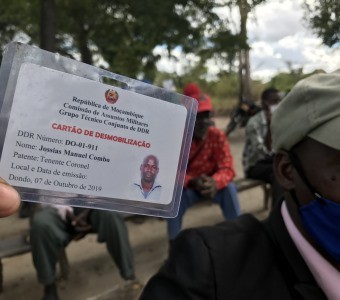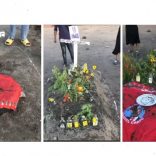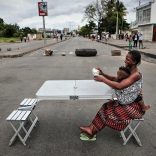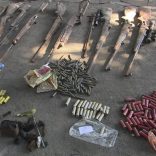Mozambique opposition leader says will not join new govt
Mozambique: Former Renamo military strategist, guerrillas denounce delays in setting pensions

FILE - For illustration purposes only. [File photo: Lusa]
The former leader of the Renamo guerrilla and military strategist for the late Afonso Dhlakama said again this Monday (18-03) that former Renamo guerrillas still lack fixed pensions and are marginalised, contrary to the guarantees of payments starting given by the government at the beginning of the month.
The person responsible for this process within Renamo, André Magibire, has promised to react soon.
Timossse Maquinze stated that former Renamo guerrillas survive by doing odd jobs in agricultural fields belonging to civilians, and are being abandoned by their wives due to hunger.
Maquinze’s statements come just days after the government said that 1,290 combatants had had their pensions fixed by the end of 2023.
According to the government’s most recent update, a quarter of the more than 5,221 former Renamo guerrillas covered by the Disarmament, Demobilization and Reintegration (DDR) process were already receiving pensions by the end of 2023.
On the 7th of March, the President of the Republic met the president of Renamo and discussed the “current stage” of the reintegration process of former guerrillas.
“The Head of State and the leader of Renamo considered the process positive, with over 74% of pensions fixed and sent to the Administrative Tribunal for ratification, of which 34% are already receiving their pensions,” a statement from the Presidency announced at the time.
In the previous report, made on November 29, Filipe Nyusi stated that 645 former guerrillas had already started receiving pensions.
Pedro Mussengue, administrator of Gorongosa, the district with the largest number of former Renamo guerrillas covered by the DDR, said that the first group of 119 demobilized guerrillas based in this area, traditionally considered an opposition stronghold, were receiving retroactive pensions.
Mussengue said that the start of pension payments betokened good prospects for the social reintegration of demobilized Renamo combatants in Gorongosa, where the former guerrilla headquarters were located.
However, Maquinze once again voiced harsh criticism of alleged delays and problems in the attribution of pensions.
“Since they were demobilized, no one has received them until today. Everyone is suffering, nobody has any money. Do you think that 1,250 meticais is enough for a former combatant’s pension? Some receive 300, others 325 and 350 meticais, that’s what they are giving to the demobilized, and they lie [when they say] that they are paying pension. The information on pension payments is misleading,” Maquinze declared.
Maquinze says he maintains contact with the combatants, asserting that many lived marginalised and abandoned lives, with the majority surviving by doing piecemeal agricultural jobs for civilians.
“If you see demobilised people from Renamo now, you will feel sorry [for them]. They end up working two days ploughing someone else’s field for five kilos of corn, and another two days in another field earning money to grind it. Their wives are abandoning them because of hunger,” he said.
Antonieta Gonzaga shares the same dissatisfaction, highlighting that none of the income generation projects planned under the DDR “are coming to fruition”.
Voice of America contacted the head of the DDR office at Renamo, André Magibire, who said that he would respond in due course.
In a previous statement, Magibire has considered “the delay in fixing pensions” “an obstacle to democracy and peace”.
The DDR process, which began in 2018, covers 5,221 former Renamo guerrillas, of whom 257 are women, and ended last June with the closure of Vunduzi base, Renamo’s last, in the district of Gorongosa, Sofala province.












Leave a Reply
Be the First to Comment!
You must be logged in to post a comment.
You must be logged in to post a comment.